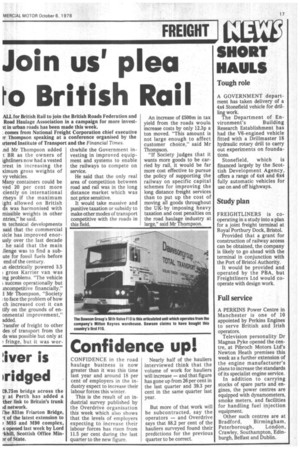Join us' plea o British Rail
Page 19

If you've noticed an error in this article please click here to report it so we can fix it.
ALL for British Rail to join the British Roads Federation and Road Haulage Association in a campaign for more investit in urban roads has been made this week.
• comes from National Freight Corporation chief executive ?r Thompson speaking at a conference organised by the trtered Institute of Transport and the Financial Times.
.nd Mr Thompson added t BR as the owners of ightliners now had a vested ..rest in increasing the KiMUM gross weights of vy vehicles.
Many containers could be ved 20 per cent more ciently on international rneys if the maximum ight allowed on British ds was harmonised with missible weights in other ntries," he said.
ki technical developments said that the commercial tide has improved enorusly over the last decade . he said that the main Menge was to find a subute for fossil fuels before end of the century.
in electrically powered 3.5 gross Karrier van was ing problems. "The vehicle L success operationally but Incompetitive financially." I. Mr Thompson, "Society , to face the problem of how ch increased cost it can tify on the grounds of enonmental improvement," added.
7ransfer of freight to other des of transport from the ds was possible but only at fringe, but it was wor thwhile the Government investing in improved equipment and systems to enable the railways to compete on service.
He said that the only real area of competition between road and rail was in the long distance market which was not price sensitive.
It would take massive and punitive taxation or subsidy to make other modes of transport competitive with the roads in this field. An increase of £500m in tax yield from the roads wouln increase costs by only 12.3p a ton moved. "This amount is not large enough to affect customer choice," said Mr Thompson. "If Society judges that it wants more goods to be carried by rail, it would be far more cost effective to pursue the policy of supporting the railway on specific capital schemes for improving the long distance freight services than to put up the cost of moving all goods throughout the UK, by imposing heavy taxation and cost penalties on the road haulage industry at large," said Mr Thompson.


























































































































































